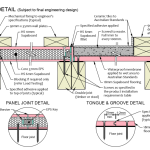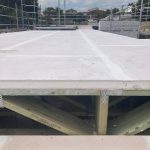
SUPABOARD – The MgO Board That Is Not Corrosive When Subject to Moisture
MgO Boards and Their Corrosive Reputation
Magnesium oxide (MgO) boards are a type of construction material that is commonly used in building applications, such as wall panels, roofing, and flooring. While MgO boards are known for their durability, fire resistance, and resistance to moisture, they can be corrosive in certain circumstances.
When moisture comes into contact with MgO boards, it can react with the magnesium oxide to produce magnesium hydroxide, which is an alkaline substance. The alkalinity of magnesium hydroxide can cause corrosion in certain metals, such as steel, aluminum, and copper, by breaking down the protective oxide layers on their surfaces.
In addition, if MgO boards are installed using metal fasteners or anchors, the same corrosive process can occur at the points where the metal comes into contact with the boards. This can lead to the deterioration of the metal fasteners over time, which can compromise the structural integrity of the building.
To prevent MgO board corrosion, it is important to ensure that the boards are installed using non-corrosive fasteners, such as stainless steel or galvanized steel. In addition, the boards should be sealed with a moisture-resistant coating to prevent moisture from penetrating the surface and reacting with the magnesium oxide. Regular inspection and maintenance can also help to identify any corrosion issues early and prevent them from becoming more serious over time.
SUPABOARD has a low free chloride content?
SUPABORD is an MgO board with a low free chloride content and has very low corrosive effects because chloride ions are one of the primary causes of corrosion in metals. When chloride ions come into contact with metal surfaces, they can accelerate the corrosion process by breaking down the protective oxide layer on the surface of the metal.
SUPABOARD contains very low concentrations of free chlorides and does not contribute to the corrosion of commercial fasteners (i.e. screw fixings)
SUPABOARD has been manufactured with sulphate instead of chloride as a chemical binder. This unique feature makes SUPABOARD non-corrosive, which is a significant advantage over other construction materials that use chloride as a binder. This also means it will not sweat in humid climates, which is a common problem in many construction materials. When exposed to moisture, materials that use chloride as a binder can take up moisture and release it, which can lead to the release of free chloride ions. However, since SUPABOARD uses sulphate as a binder, it does not have this issue, making it a reliable and long-lasting construction material that is suitable for use in a wide range of environments.
MgO boards with a low free chloride content contain fewer chloride ions, which means that they are less likely to react with metal surfaces and cause corrosion. Additionally, SUPABOARD with its low chloride content is manufactured using a high-purity magnesium oxide, which further reduces the potential for corrosion. By reducing the chloride content in MgO boards, it is possible to minimize the corrosive effects and increase the lifespan of metal components in buildings that incorporate these boards.
SGS Industries and Environment Test
In 2022, SGS Industries and Environment undertook a comprehensive corrosion testing study on SUPABOARD, a popular building material. The testing was extensive and aimed at determining the product’s corrosion resistance capabilities. The study was conducted over a considerable period and involved various methods, including salt spray testing, electrochemical impedance spectroscopy, and immersion testing. The results of the testing were compiled in a detailed report that was submitted in December 2022. The report provided valuable insights into SUPABOARD’s corrosion resistance properties, which are essential for its continued use in the building industry.
The purpose of the test was to subject the product to a highly corrosive environment to assess the extent of corrosion on typical fixings through the board and any consequential corrosion apparent on the substrate material (timber and steel battens).
SGS Industries and Environment were selected for the testing of SUPABOARD because they are widely regarded as a reputable and reliable company in the testing, inspection, and certification industry. With over 140 years of experience, SGS has built a strong reputation for providing high-quality services and maintaining the highest standards of professionalism. Their extensive network of laboratories and offices across the world allows them to offer their services to a broad range of clients in various industries.
The purpose of the test was to subject the product to a highly corrosive environment to assess the extent of corrosion on typical fixings through the board and any consequential corrosion apparent on the substrate material (timber and steel battens). The method of testing involved full immersion of the product in deionised water for extended periods of time to assess the presence of free chlorides at the culmination of the test period and to assess the extent of corrosion. ‘Control’ samples (PE plastic boards) were included in the test as a means of comparing corrosion rates between SUPABOARD and an inert material, using the same types of mechanical fixings (screws).

SUPAFLOOR ADVANTAGES
SUPAFLOOR DISADVANTAGES
Ask BUILDITECO more about SUPAFLOOR...
SGS Testing Results and Observations
The follwing commentary is from an appraisal completed by Milestone Building Code Certifiers regarding the SGS Corrosion Test Results.
In summary the test results were noted by SGS as follows (paraphrasing the conclusions in their report) –
• The free chloride content in the SUPABOARD products was very low when compared with other, similar marketed products (i.e. 0.057% for SUPABOARD vs up to 10% for other products).
• The low free chloride content is reflected in the very low corrosive effects on the mechanical fixings i.e. there is a direct relationship between the extent of free chloride and the extent of corrosion.
The report also notes that the corrosion observed in the SUPABOARD samples was less than those observed in the control samples.
The findings of the test report support the assertion that the SUPABOARD product does not contribute to the premature corrosion of mechanical fixings in typical construction assemblies (walls and floors) that may be subject to moisture
The findings of the test report are summarised by SGS as follows:
“SUPABOARD contains very low concentrations of free chlorides and does not contribute to the corrosion of commercial fasteners” (i.e. screw fixings).
In my opinion, the findings of the test report support the assertion that the SUPABOARD product does not contribute to the premature corrosion of mechanical fixings in typical construction assemblies (walls and floors) that may be subject to moisture – noting that the selection of fixings should be as specified by Builditeco.
View The SGS Test Results
SUPABOARD Protects SUPAFLOOR
SUPABOARD makes up the outer skin of SUPAFLOOR, providing it with excellent non-corrosive properties that protect fixings and increase the longevity of the subfloor flooring system.
SUPAFLOOR is a high-performance insulated subfloor flooring system that offers several advantages to users in Australia. One of the key advantages of using SUPAFLOOR is that it provides excellent thermal insulation, which helps to maintain a comfortable indoor temperature throughout the year. This can result in significant energy savings, as heating and cooling costs can be reduced. The system is also easy to install, which can save time and money for builders and homeowners.
Additionally, SUPAFLOOR is resistant to moisture and pests, making it an ideal flooring solution in areas that are prone to dampness or insect infestations. The system is also durable and long-lasting, with a high load-bearing capacity, making it suitable for a wide range of applications. SUPAFLOOR is also environmentally friendly, as it is made from recyclable materials and has a low carbon footprint, making it an excellent choice for those looking to reduce their environmental impact.
SUBFLOOR OF | SUPAFLOOR SYSTEM | CHIPBOARD PARTICLEBOARD | AERATED CONCRETE | COMPRESSED CEMENT | SUSPENDED CONCRETE |
|---|---|---|---|---|---|
| Cost Effectiveness | |||||
| Workability | |||||
| Acoustic Performance | |||||
| Thermal Efficiency | |||||
| Moisture Resistant | |||||
| Fire Resistant | |||||
| Wet Area Included | |||||
| Strong Structural Feel | |||||
| Always Easy Finish | |||||
| Environmental Impact | |||||
| Overall Rating | 10/10 | 2/10 | 4/10 | 3/10 | 5/10 |
Compare SUPAFLOOR to the Competition
Written by Matthew De Pledge




